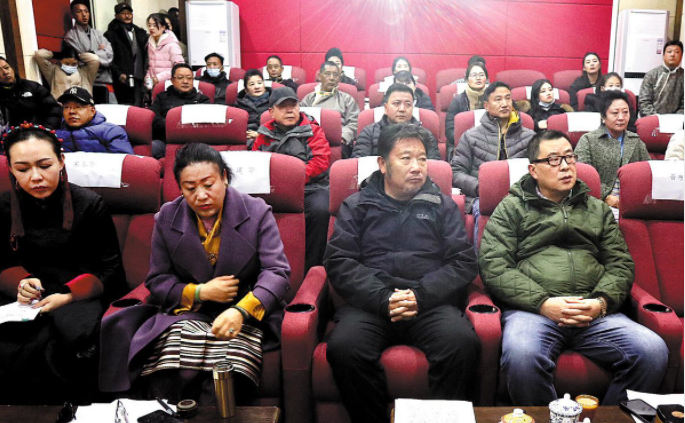Dubbed films give Tibetans a window to the world
Updated: 2022-01-04 (China Daily)  Print
Print 



Participants attend a seminar on the history and achievements of film dubbing and production in the Tibet autonomous region in Lhasa. PALDEN NYIMA/CHINA DAILY
The history and achievements of film dubbing and production in the Tibet autonomous region over the past 60 years were reviewed at a seminar in Lhasa, the regional capital, last month.
More than 3,000 films and 50 television dramas have been dubbed in Tibetan over the past six decades.
Some popular films that have received the treatment, including The Founding of an Army, Amazing China and 40,000 Kilometers, have been screened at the same time as in other Chinese provinces and autonomous regions, the Tibet Film Public Service Center, which hosted the seminar, said.
Zhang Jianhua, the center's Party secretary, said that with the support of the Changchun Film Studio-China's first movie production company, based in Jilin province-Tibet began exploring dubbing in 1957.
"A Tibetan dubbing team was established in 1965 in the region, and the first film dubbed in Tibetan was produced," he said. "Since then, increasing numbers of films have been made available.
"They have provided scientific knowledge to farmers and herdsmen and enriched the spiritual life of residents."
The center translated 93 films this year: 30 scientific and educational documentaries and 63 feature films.
Tsering Yudron, deputy head of the regional office of the Tibetan Language Committee, said dubbing in the Tibetan language is a key part of China's ethnic film work, and the regional government regards it as an important cultural effort.
"The regional government has provided great support in the areas of facility construction, talent cultivation and equipment upgrades," Tsering Yudron said, adding that dubbing has contributed greatly to the region's social stability and high-quality development.
Wang Yifeng, director of the dubbing center at the State production base of China Film Group, said China started dubbing public welfare films into different languages to build a bridge between ethnic groups, enrich cultural life and broaden people's exposure to innovation, poverty reduction and societal transformation.
"By dubbing more films in the languages of different ethnic groups, people can learn about national policies, and knowledge related to the sciences, culture, safety, health and social and economic development," Wang said.
Socho Drolma, a voice actress at the Tibet Film Public Service Center, said working conditions were terrible when dubbing started, with the sound insulation in the dubbing room so bad that the sounds of birds and chickens were recorded along with the soundtrack.
Socho Drolma, who was born into a rural family, started working for the region's film company after graduating from junior middle school in 1965.
She said she had to undertake different roles including translator, interpreter, projectionist and sound recordist, as well as being a voice actress.
"Films with Tibetan soundtracks became popular among farmers and herdsmen," she said. "Poor transportation did not prevent them from traveling long distances to watch films; they even came riding horses and yaks."
Basang Norbu, a sound recordist at the center, said the number of staff members working on dubbing has grown from four in 1965 to 36.
"Over the years, dubbing has always been about providing opportunities for the audience to watch films, providing them with good entertainment, and ensuring them understand the meaning of the films," he said.
"For decades, these dubbed films have been a window for Tibetans to get to know the outside world."








